Testing is an essential part of web application development. No website is ready for deployment until testing is done. In my opinion, every web application requires testing irrespective of what technologies are used in it.
There are different types and methods for testing web applications. Many open-source developers have already combined these testing methods into reusable libraries.
There are several React testing libraries for quickly testing a React web application. Each of them has its advantages and disadvantages.
In this article, we will discuss what are the best React testing libraries for your specific project.
Jest
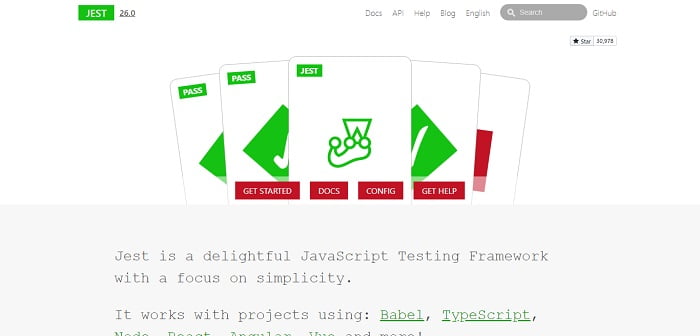
Jest is a React testing library and considered one of the best by many developers. It is created and maintained by Facebook. Along with React, it can also work with TypeScript, Node.js, Angular, and Vue.js.
Apart from Facebook, Jest is also used at Airbnb, Uber, Instagram, Revolut, and many more. The React community consider Jest as the first choice for React unit testing.
Jest is simple to use. It is available in Node Package Manager (NPM), and it requires little configuration. If a person has experience in JavaScript, it won’t be difficult to write tests in Jest.
Pros:
- Jest is open-source.
- It supports parallel testing.
- Mock by default in Jest makes the testing easy and simple.
- Jest is also applicable for testing React native applications.
- It is fast and also supports promises.
- DOM testing can also be done in Jest because it can bundle with JSDOM.
- It has great documentation.
Cons:
- It is difficult to run a single test.
- There are multiple error messages for a single error.
At GitHub, Jest has over thirty-one thousand stars, making it the most popular React testing library in this list.

Jest is one of the most popular and commonly used React testing library and React unit testing library. It is backed by one of the IT giants and so provides a delightful testing experience.
Jasmine
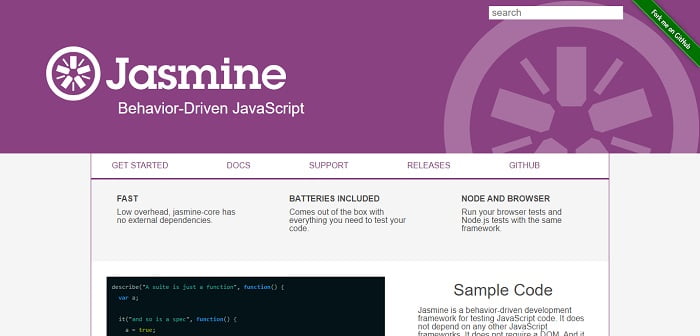
Jasmine is another popular React testing library. Basically, it is a behavior-driven library that is used for testing JavaScript code.
It is independent of browsers and DOM, even it does not rely on any other JavaScript library or framework. Jasmine is used by many famous companies such as Walmart, Gitlab, Accenture, Okta, E-Commerce, and many more.
Pros:
- Jasmine is independent, it does not even depend on DOM.
- It is open-source.
- It has a simple and descriptive syntax for Behavior Driven Development (BDD).
- It can also be used with Test Driven Development (TDD).
- It is simple to use.
- Configuring Jasmine is also easy and simple.
Cons:
- It is a bit difficult when it comes to asynchronous testing.
- It expects .specjs.js extension for every test file.
Jasmine has over fourteen thousand stars on GitHub. It is quite popular but considered as a library of the older generation.

Jasmine is popular but many consider it an older generation React testing tool when compared with React testing library such as Mocha.
React testing library
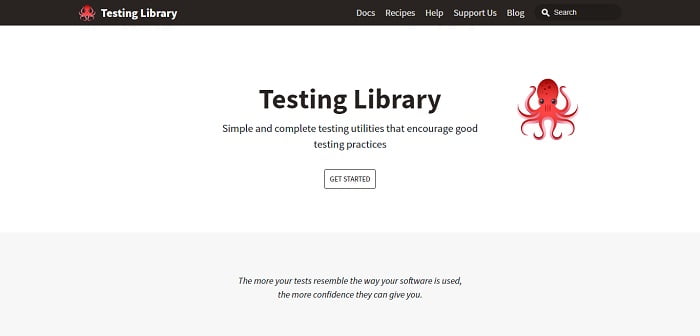
React testing library is a light-weight library that is used for testing React components. It works on the top of react-dom/test-utils and react-dom. React testing library works with DOM nodes rather than rendered components.
It is used by companies such as Commercetools, Hivebrite, page-builder, Africa Code, and MPB.
Pros:
- React testing library is capable of testing behavior.
- It has a complete set of DOM testing utilities.
- It is easy to imitate workflow and user actions using the React testing library.
- It can be integrated with frameworks such as Angular, React, and Vue.
Cons:
- No shallow rendering.
React testing library has over eleven thousand stars on GitHub.

React testing library has become quite popular among React professionals. Today, it is even considered as the replacement of another popular testing library known as Enzyme.
Enzyme
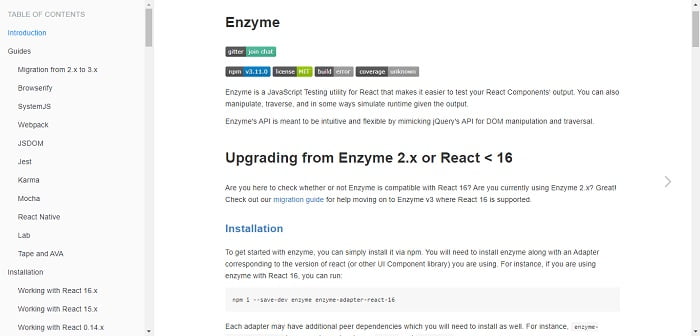
While testing React with popular libraries such as Jest, professionals always encounter enzyme. Enzyme is a React testing utility, and often considered a testing library. It is used to make the testing of outputs easier.
Enzyme is frequently used with Jest, Mocha, Karma, and other testing libraries. Many companies such as Airbnb, Frontend, BlaBlacar, and, Kaidee use Enzyme.
Pros:
- It uses shallow rendering.
- Full DOM rendering can be conducted with Enzyme.
- Bussiness implementation of the components can be accessed.
Cons:
- It is a testing utility, not a proper library.
- It requires additional libraries such as Jest.
Enzyme has over eighteen thousand stars on Github.

It is tough to dive into testing React components with libraries such as Jest without enzyme. It is a very popular utility in the React testing community.
Mocha
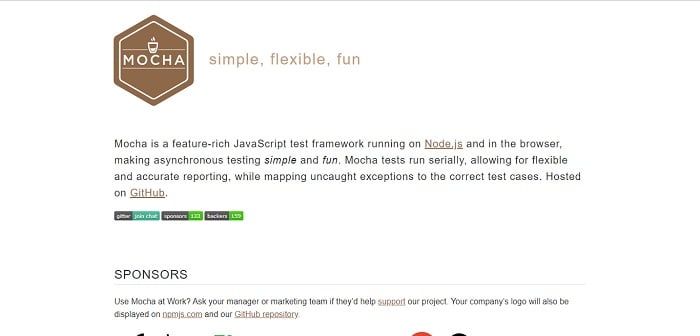
Mocha is a testing framework for Node.js. It can run in the browser as well as outside the browser. It is also possible to do asynchronous testing with Mocha.
Mocha is used by companies such as Coursera, Accenture, Asana, Paralect, and Typeform.
Pros:
- Mocha supports asynchronous testing.
- It is simple and easy to use.
- It is available as an open-source project.
- It can also be used for server and browser testing.
- Mocha is flexible.
- Support for generators can easily be added with Mocha.
Cons:
- Common tasks such as adding a snapshot can require more tools.
It has nearly twenty thousand stars on GitHub.

Mocha has become very popular among React professionals because of its simplicity, flexibility, and support for node.js/browser testing.
Chai

Chai is an assertion library. It is used to test node.js and browser-based apps. Chai can be paired with any JavaScript testing library or framework. It is considered a very user-friendly library because it allows the user to choose from several interfaces.
Chai is used by companies such as Brainhub, MOVILL, payever, Socialbakers, Clovis, and Keepfy.
Pros:
- It supports Behavior Driven Development as well as Test-Driven Development.
- There are several interfaces.
- Chai can easily integrate with other JavaScript testing frameworks and libraries.
Cons:
- Chai is new and still developing.
- The community is small.
Chai has got nearly seven thousand stars on its GitHub repository.

Chai might not be as popular as Jest or Mocha, but still it is gaining popularity. It is often used with Mocha and Enzyme or Jest and Enzyme.
Karma
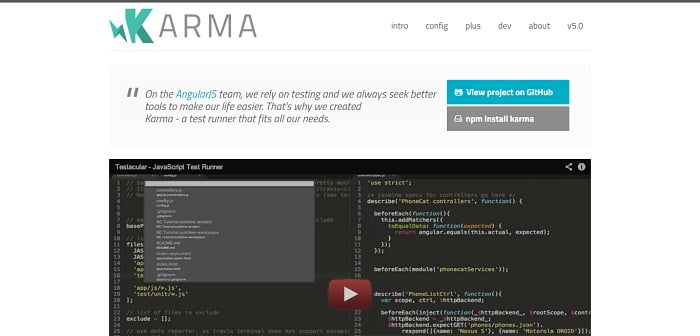
Karma is often regarded as a React testing library, but actually it is a tool that launches a server (HTTP) and generates a file (HTML) that is a test runner. karma allows a user to run the files in any real browser.
Karma is used in companies such as Accenture, Typeform, Gitlab, Happn, SuperHuman, and Frontend.
Pros:
- Karma is a perfect test runner.
- It is open-source.
- It enables testing on real devices.
- It supports continuous integration.
- Debugging is easy with Karma.
Cons:
- It does not provide many features.
Karma has over eleven thousand stars at GitHub.

Karma is backed by Google and it is a very good choice for running tests.
Cypress
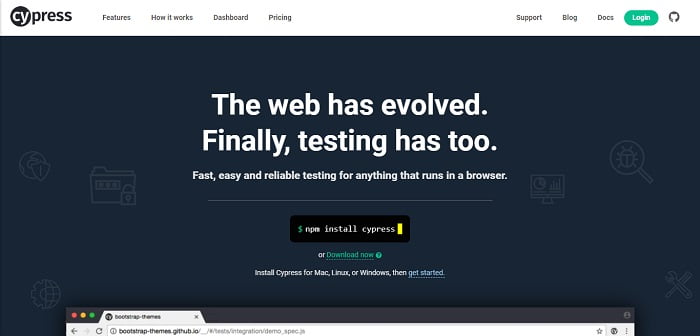
Cypress is an end to end testing framework. It is used to write and run tests in a browser. It is used in an actual browser that lets the user use the browser’s dev tools making testing more easy and comfortable. Cypress can be used on any website or front-end framework.
Many companies use of Revolut, BaseDash, MAK IT, Tiqets, and Circle CI.
Pros:
- Cypress comes with its own dashboard. It helps in controlling the tests easily.
- It is simple to use.
- It has great documentation.
- It can easily be used with CI tools.
Cons:
- The community is still developing.
- The structure of Cypress is new that takes time to understand.
Cypress has over twenty thousand stars at GitHub.

Cypress is a new framework but it is gaining popularity. It comes with various features that can make React testing easy and comfortable.
Final verdict
There are several React testing libraries. Each of them has its own features, pros, and cons. Some of these can be classified as libraries or frameworks while some are just utilities that are used effectively with these libraries and frameworks.
Jest is one of the most popular React testing library. It is frequently used with Enzyme for better results and experience. Mocha and Jasmine are other popular React testing frameworks that are used with Enzyme.
Cypress and Chai are new React testing libraries that are still gaining popularity. They might not have large communities but still they have many features that can be combined with other libraries and frameworks to test React components.
Choosing a React testing library can be a pain because there are too many. In this article, I listed some of the best React testing libraries with their pros, cons, and popularity stats.
Now its your turn to choose the one which suits your specific requirements.
